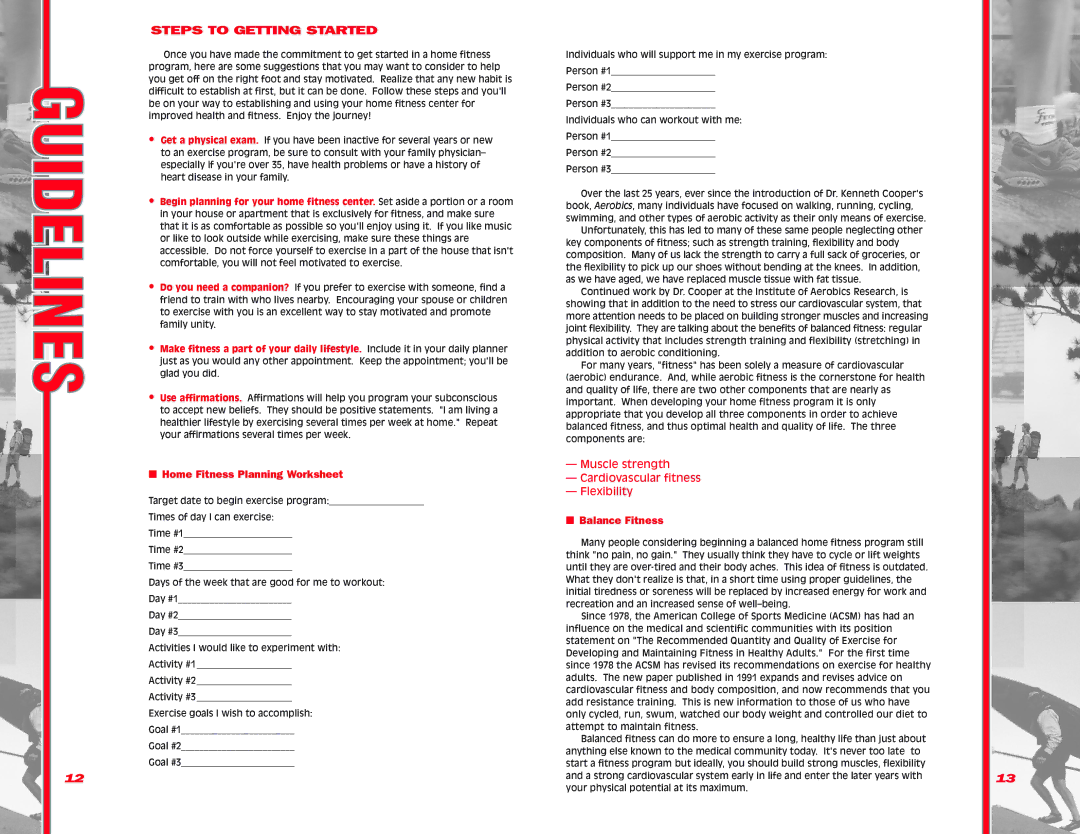
STEPS TO GETTING STARTED
Once you have made the commitment to get started in a home fitness program, here are some suggestions that you may want to consider to help you get off on the right foot and stay motivated. Realize that any new habit is difficult to establish at first, but it can be done. Follow these steps and you'll be on your way to establishing and using your home fitness center for improved health and fitness. Enjoy the journey!
•Get a physical exam. If you have been inactive for several years or new to an exercise program, be sure to consult with your family physician–
especially if you're over 35, have health problems or have a history of heart disease in your family.
•Begin planning for your home fitness center. Set aside a portion or a room
in your house or apartment that is exclusively for fitness, and make sure that it is as comfortable as possible so you'll enjoy using it. If you like music or like to look outside while exercising, make sure these things are accessible. Do not force yourself to exercise in a part of the house that isn't comfortable, you will not feel motivated to exercise.
• Do you need a companion? If you prefer to exercise with someone, find a friend to train with who lives nearby. Encouraging your spouse or children to exercise with you is an excellent way to stay motivated and promote family unity.
•Make fitness a part of your daily lifestyle. Include it in your daily planner
just as you would any other appointment. Keep the appointment; you'll be glad you did.
•Use affirmations. Affirmations will help you program your subconscious to accept new beliefs. They should be positive statements. "I am living a healthier lifestyle by exercising several times per week at home." Repeat your affirmations several times per week.
■Home Fitness Planning Worksheet
Target date to begin exercise program:_____________________
Times of day I can exercise:
Time #1________________________
Time #2________________________
Time #3________________________
Days of the week that are good for me to workout:
Day #1_________________________
Day #2_________________________
Day #3_________________________
Activities I would like to experiment with:
Activity #1 _____________________
Activity #2 _____________________
Activity #3 _____________________
Exercise goals I wish to accomplish:
Goal #1_________________________
Goal #2_________________________
Goal #3_________________________
12
Individuals who will support me in my exercise program:
Person #1_______________________
Person #2_______________________
Person #3_______________________
Individuals who can workout with me:
Person #1_______________________
Person #2_______________________
Person #3_______________________
Over the last 25 years, ever since the introduction of Dr. Kenneth Cooper's book, Aerobics, many individuals have focused on walking, running, cycling, swimming, and other types of aerobic activity as their only means of exercise.
Unfortunately, this has led to many of these same people neglecting other key components of fitness; such as strength training, flexibility and body composition. Many of us lack the strength to carry a full sack of groceries, or the flexibility to pick up our shoes without bending at the knees. In addition, as we have aged, we have replaced muscle tissue with fat tissue.
Continued work by Dr. Cooper at the Institute of Aerobics Research, is showing that in addition to the need to stress our cardiovascular system, that more attention needs to be placed on building stronger muscles and increasing joint flexibility. They are talking about the benefits of balanced fitness: regular physical activity that includes strength training and flexibility (stretching) in addition to aerobic conditioning.
For many years, "fitness" has been solely a measure of cardiovascular (aerobic) endurance. And, while aerobic fitness is the cornerstone for health and quality of life, there are two other components that are nearly as important. When developing your home fitness program it is only appropriate that you develop all three components in order to achieve balanced fitness, and thus optimal health and quality of life. The three components are:
—Muscle strength
—Cardiovascular fitness
—Flexibility
■Balance Fitness
Many people considering beginning a balanced home fitness program still think "no pain, no gain." They usually think they have to cycle or lift weights until they are
Since 1978, the American College of Sports Medicine (ACSM) has had an influence on the medical and scientific communities with its position statement on "The Recommended Quantity and Quality of Exercise for Developing and Maintaining Fitness in Healthy Adults." For the first time since 1978 the ACSM has revised its recommendations on exercise for healthy adults. The new paper published in 1991 expands and revises advice on cardiovascular fitness and body composition, and now recommends that you add resistance training. This is new information to those of us who have only cycled, run, swum, watched our body weight and controlled our diet to attempt to maintain fitness.
Balanced fitness can do more to ensure a long, healthy life than just about anything else known to the medical community today. It's never too late to start a fitness program but ideally, you should build strong muscles, flexibility
and a strong cardiovascular system early in life and enter the later years with13 your physical potential at its maximum.
